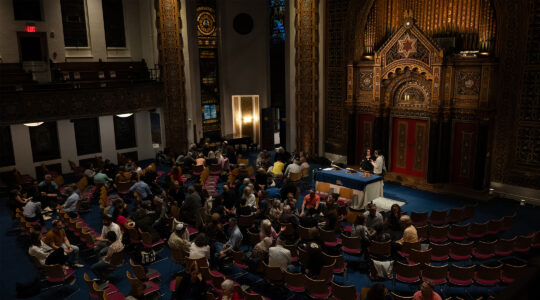City and state budget cuts will slash deep into programs run by the Jewish social service network, including 10 senior centers under Jewish auspices that are slated to close at the end of June.
Overall, UJA-Federation agencies are struggling with an estimated $100 million shortfall in projected income due to the recession in what one official called the worst crisis in nearly a quarter century.
The 10 centers represent 20 percent of the 50 centers that will lose their contract with the Department for the Aging under Mayor Michael Bloomberg’s proposed budget. The mayor did not rule out an additional 25 centers if Albany does not provide more funding for the city.
Closing the centers, part of the city’s tough fiscal medicine as it faces uncertainty about the level of funding available from a struggling state, would leave perhaps thousands of seniors without a place to find benefits referrals, social interaction or have a nutritious communal meal.
“This is a complete evisceration of city services to seniors, and a pretty radical change in the way we provide for our poorest and most vulnerable seniors,” said City Councilmember Jessica Lappin, who chairs the Council’s Committee on Aging in an interview on Tuesday following a meeting with Lilliam Barrios-Paoli, commissioner of the Department for the Aging.
Lappin said she had reviewed the list of centers to be closed with an eye toward saving some of them, although she agreed that some were not cost-effective in terms of the number of people served.
“A huge part of our budget is dependent on what happens in Albany, so it’s hard for us to know what to do until they know what they are going to do,” said Lappin, a Democrat who represents part of the Upper East Side.
She noted that a large portion of the $25 million in Title XX funding for the aging in the state budget was restored by legislators after it was cut by Gov. David Paterson, and that members of the City Council may also act to restore the grants from discretionary funds.
“Anything is possible,” said Lappin. “We are at the beginning of a process, discussing it with members and we will take it from there, one step at a time.”
Eight of the 10 senior centers under Jewish auspices to be closed, all of which provide nonsectarian services, are run by the Jewish Association for Services to the Aged. The others are run by the Educational Alliance and the United Jewish Council on the East Side. Sixteen of the service centers to be closed are in Manhattan, 10 in Queens, 11 in Brooklyn, nine in the Bronx and four on Staten Island.
The programs on the chopping block include JASA’s centers in Astoria, Holliswood, Whitestone and Jackson Heights in Queens and Parkchester and Co-Op City in the Bronx. Also affected are the Jacob Riis Senior Center at the Educational Alliance and a center at the Lillian Wald Houses on the Lower East Side.
The CEO of JASA, Aileen Gittelson, did not return several calls seeking comment as of Tuesday night.
Support the New York Jewish Week
Our nonprofit newsroom depends on readers like you. Make a donation now to support independent Jewish journalism in New York.
Bobbie Sackman, director of policy for the Council of Senior Centers and Services, said the cuts would deprive hundreds of seniors of a key regular interaction outside the home, for some the only one.
“When you close those centers, there is no guarantee that those people will attend another center,” she said. “They will be isolated, especially people in their 80s and 90s who can’t travel easily. That can lead to health and mental deterioration and also a loss of nutrition.”
In a statement, Barrios-Paoli, the commissioner of the Department for the Aging said “We embarked on this painful process, because the state’s budget cut left us no other option. We are committed to doing what we can for the seniors and center staff whose lives will be affected. We will be providing all possible assistance through the difficult weeks ahead.”
Seniors won’t be the only ones feeling the budget pain. UJA-Federation agencies, such as the Federation Employment and Guidance Service, the Metropolitan Council on Jewish Poverty and the Jewish Board of Family and Children’s Services, already struggling to maintain services with diminishing public and private money, will see drastic reductions for immigrant relocation funds, treating and preventing child abuse, and programs to provide food, housing and counseling for the poor.
“We won’t know which of our programs will be hit the hardest until we see the actual budget,” said William Rapfogel, executive director of Met Council.
Ron Soloway, managing director of external and governmental relations for UJA-Federation, said the New York City cuts were less severe than those from state agencies, but together they packed a powerful punch.
“Through the last two years of this recession, human services agencies have probably forgone cost-of-living adjustments of somewhere between 7 and 9 percent of expected income,” he said. “I think the cuts we will sustain this year will result in foregone income of another 3 to 5 percent. When this year is finished over the last three years agencies will have found more than 10 percent of expected income in the reduction in the service provided. In the Jewish community that probably means a loss of expected revenue in the realm of $100 million.” At the end of the day, he said, perhaps one third may be restored in negotiations with legislators.
Soloway said that even if proposed measures to increase revenues, such as a tax on some soft drinks or allowing wine to be sold in grocery stores, are approved by the Legislature, the revenue would only make up about a billion, out of a $9 billion deficit.
|
Signup for our weekly email newsletter here. Check out the Jewish Week’s Facebook page and become a fan! And follow the Jewish Week on Twitter: start here. |




